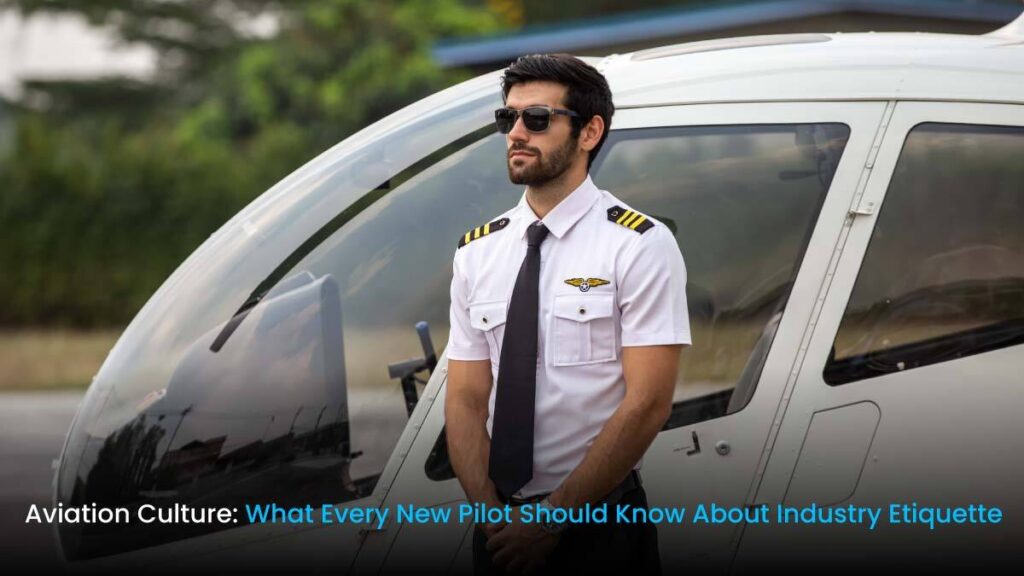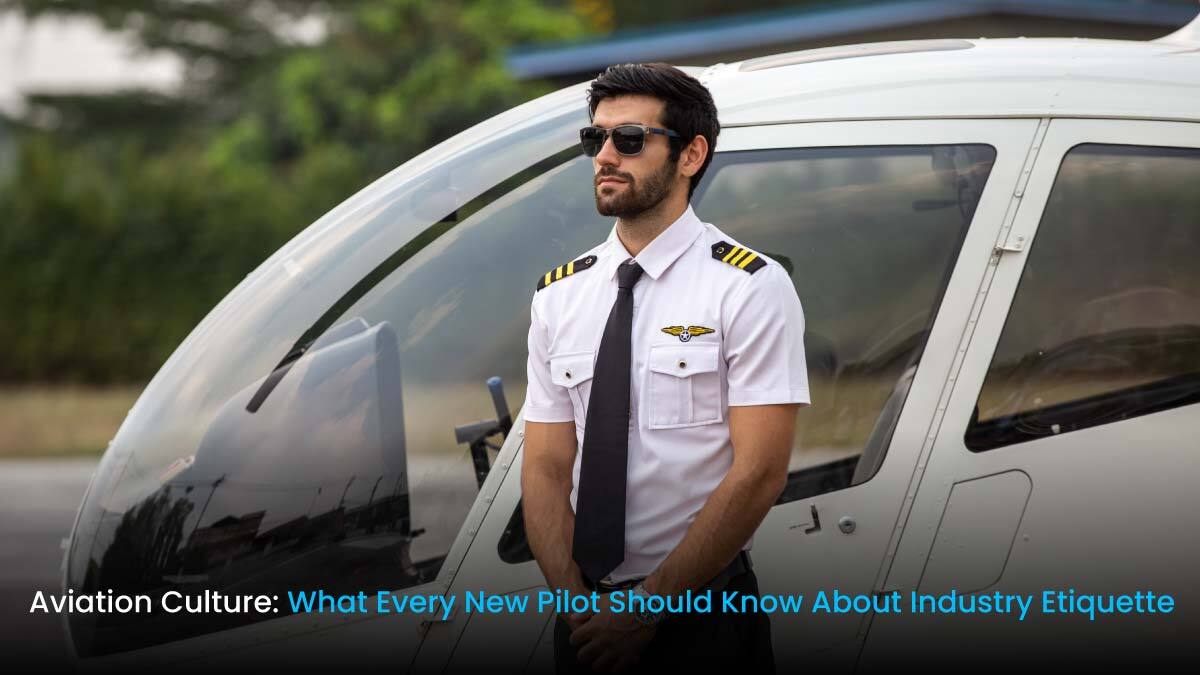
Any aspiring aviator finds it an exciting experience to enter the aviation industry. The possibilities are unlimited, but in addition to technical expertise and flying prowess, a good pilot must also possess an unsaid but crucial component: an awareness of aviation etiquette and culture. Understanding the cultural rules within the aviation profession will lead to your professional success and enduring workplace relationships with your fellow pilots.
Respect the Hierarchy
A system of structure and discipline forms the foundation of aviation operations. When beginning your pilot training you will immediately observe that hierarchy features strongly throughout the program. All aviation professionals from captains to first officers to flight instructors need their roles respected. This represents both safety measures and operational efficiency so show your senior members proper reverence for professional conduct.
You must regard everyone you encounter who has more flight experience and has contributed to a successful aviation operation, including pilots, air traffic controllers and ground staff.
Communicate Clearly and Professionally
Communication is the backbone of aviation. Pilots are trained to follow flying rules and regulations, which include using precise and concise language. Whether you’re talking to air traffic control (ATC) or your co-pilot, clarity is crucial. Miscommunication can lead to serious consequences.
The aviation standard phrases and technical vocabulary are a part of your training curriculum. The radio requires the usage of official flight terminology instead of casual expressions. Enhanced communication demonstrates your dedication to professional aviation while simultaneously making you a better pilot.
Be Punctual and Prepared
There are rigorous schedules for aviation operations. Your ability to appear on time demonstrates professional behaviour in your employment as a pilot. Delays resulting from late arrival cause operational interruptions that affect ground personnel processes followed by airline customer travel timelines. Before flight departure, you need to examine flight plans together with weather reports and official aviation rule updates in detail.
Working in compliance with company defined procedures and keeping your personal appearance flawless marks your readiness status. Your appearance within the aviation industry communicates your professional attitude toward your work since the field demands both internal and external discipline.
Prioritize Safety Over Ego
New pilots frequently make the error of allowing their egos to damage their decision-making abilities. Each pilot must prioritise safety because it represents their first responsibility. When faced with an uncertain situation you should directly ask for help instead of second-guessing yourself. An admission of ignorance shows both maturity and professionalism instead of weakness.
Operating according to pilot rules alongside prioritising safety will increase your colleagues’ trust and respect for you. As a professional pilot, their educational journey continues throughout their entire aviation career.
Build Strong Relationships with the Team
Being able to fly requires multiple team members working together. Your colleagues from cabin crew to co-pilot to ground staff need trusted relationships for success. Show respect to anyone you meet at any rank in the workplace system.
The need for collaboration becomes crucial during emergencies. Spending time to build trust between team members will lead to better crisis management outcomes which produces lasting benefits for your organisation.
Adhere to the Flying Rules and Regulations
Every pilot is expected to follow the established flying rules and regulations of their respective region. These rules are in place to ensure safety and standardisation. For instance, Indian pilot qualification requirements are set by the Directorate General of Civil Aviation (DGCA) to maintain high standards for pilots operating in India.
As a pilot, staying updated on regulatory changes and being aware of international standards will help you navigate your career with confidence. Ignorance of the rules is never an excuse in aviation, so make continuous learning a priority.
Understand Cultural Sensitivities
If you aspire to become a commercial pilot in India or any other part of the world, understanding cultural nuances is important. Aviation is a global industry, and you’ll interact with professionals from diverse backgrounds. Respecting cultural differences and adapting to varied work environments will make you a more effective and respected pilot.
For instance, when flying to different countries, familiarise yourself with local aviation practices and etiquette. This demonstrates your professionalism and commitment to being a global aviator.
Stay Humble and Open to Feedback
No matter how skilled you become, there’s always room for improvement. Aviation is an industry where complacency can have serious consequences. Embrace feedback from your instructors, peers, and superiors. Constructive criticism is an opportunity to learn and grow.
During training, you may face challenging situations that test your abilities. Instead of taking feedback personally, use it as a stepping stone to become a better pilot.
Keep the Aircraft Clean and Organized
Pilots often share aircraft with others, especially during training and early in their careers. Maintaining cleanliness and organisation is a sign of respect for the next user. This includes checking the cockpit, ensuring all equipment is in its proper place, and cleaning up any personal items before leaving.
While this may seem like a minor detail, it reflects your overall attitude toward professionalism and teamwork.
Balance Confidence with Humility
Confidence is an essential trait for any pilot, but it must be balanced with humility. Overconfidence can lead to errors, while humility keeps you grounded and open to learning. Recognise your achievements but remain aware of your limitations.
Being humble also helps you connect better with others in the industry. Pilots who respect their peers and acknowledge their contributions create a positive and supportive environment.
Never Stop Learning
Aviation is an ever-evolving industry. New technologies, aircraft models, and regulations are constantly introduced, making continuous learning essential. Staying updated on advancements in aviation not only enhances your skills but also ensures you remain compliant with pilot rules and industry standards.
Consider joining professional associations, attending workshops, and participating in simulator training to stay ahead in your career. For instance, understanding the latest updates in flight rule aviation can give you a competitive edge.
Conclusion
Aviation culture is more than just rules and procedures; it’s a way of life that emphasises discipline, respect, and continuous improvement. As a new pilot, embracing industry etiquette will not only make you a better aviator but also help you build a strong reputation within the community. Whether you’re working toward meeting Indian pilot qualification standards or learning to master international flying rules and regulations, the key is to remain professional, humble, and safety-conscious.
By integrating these values into your daily routine, you’ll not only excel in your career but also contribute positively to the aviation industry as a whole. So, gear up, stay curious, and take to the skies with confidence—your journey as a pilot has only just begun.
FAQs
Q. Why is professionalism important in aviation?
A. The fundamental requirement in aviation is professionalism which delivers safety together with operational efficiency and respectful conduct for every procedure. The aviation team depends on collaborative relationships between pilots and crew members and support staff to correctly comprehend their responsibilities. A workplace ethic built on professionalism helps teams trust each other more while creating environments where everyone meets industry protocols.
Q. How should a new pilot communicate with other crew members?
A. New pilots should communicate clearly, respectfully, and professionally with all crew members. Use standard aviation language, listen actively, and avoid casual or unclear phrases. Being polite and open to feedback helps create a positive working relationship.
Q. What is the significance of personal appearance and grooming for pilots?
A. The way a pilot presents themselves in terms of appearance and grooming indicates both their readiness and their professionalism. A pilot who maintains an appropriate appearance creates both passenger trust in their capabilities and a sense of respect among colleagues. The protocols of the aviation sector require maintaining high standards that match how people understand professionals through their first interactions.
Q. What is the role of safety culture in aviation etiquette?
A. Flight safety constitutes the fundamental foundation of aviation etiquette. Staff members both onboard and in the cockpit prioritise safety above every other consideration while maintaining procedural correctness. The culture exists to develop trust while reducing hazards which leads to protected environments for all participating personnel.
Q. How should new pilots interact with ground crew and support staff?
A. New pilots should treat ground crew and support staff with respect and appreciation. Recognise their critical role in ensuring the flight’s success, communicate politely, and collaborate effectively. Building strong relationships with them improves teamwork and operational efficiency.
Q. How does aviation culture emphasise the importance of a work-life balance?
A. Aviation culture supports work-life harmony because it produces increased focus together with lower stress levels. The aviation industry supports pilots to spend time with loved ones and get rest after their flight duties. Such a balanced combination leads to better performance alongside protecting their long-term health.

